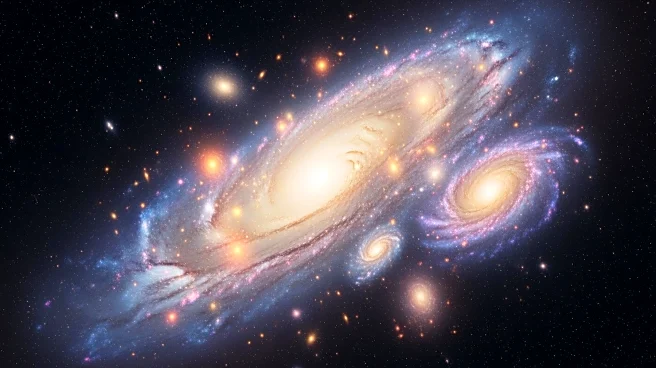What's Happening?
Researchers from Chiba University, led by Associate Professor Tomoaki Ishiyama, have conducted extensive cosmological simulations to investigate the potential variability of dark energy over time. Utilizing Japan's supercomputer Fugaku, the team performed
high-resolution N-body simulations to compare the standard Lambda Cold Dark Matter (ΛCDM) model with a dynamic dark energy (DDE) model. The study, published in Physical Review D, suggests that a time-varying dark energy component could significantly influence the formation and growth of cosmic structures. The simulations incorporated data from the Dark Energy Spectroscopic Instrument (DESI), revealing that increased matter density could lead to the formation of more massive galaxy clusters in the early Universe.
Why It's Important?
The findings challenge the long-standing assumption that dark energy remains constant, proposing instead that its variability could reshape our understanding of cosmic evolution. This research has implications for future astronomical observations and the interpretation of data from upcoming galaxy surveys. By demonstrating how changes in cosmological parameters, particularly matter density, affect structure formation, the study provides a theoretical basis for analyzing new data. The potential for dynamic dark energy to alter the cosmic framework could lead to revisions in current cosmological models, impacting theories about the Universe's expansion and the distribution of galaxies.
What's Next?
The research sets the stage for future observational campaigns, such as those from the Subaru Prime Focus Spectrograph and DESI, which are expected to refine measurements of cosmological parameters. These simulations will be crucial in interpreting forthcoming data, potentially confirming the dynamic dark energy model. As new surveys improve the precision of cosmic measurements, researchers will be able to test the validity of the DDE model further, potentially leading to a paradigm shift in cosmology.
Beyond the Headlines
The exploration of dynamic dark energy opens up discussions about the fundamental nature of spacetime and the forces driving the Universe's expansion. It raises questions about the interplay between dark energy and matter density, suggesting that even small changes can have profound effects on cosmic structure. This research could lead to new insights into the origins and fate of the Universe, challenging existing theories and inspiring further scientific inquiry.
















